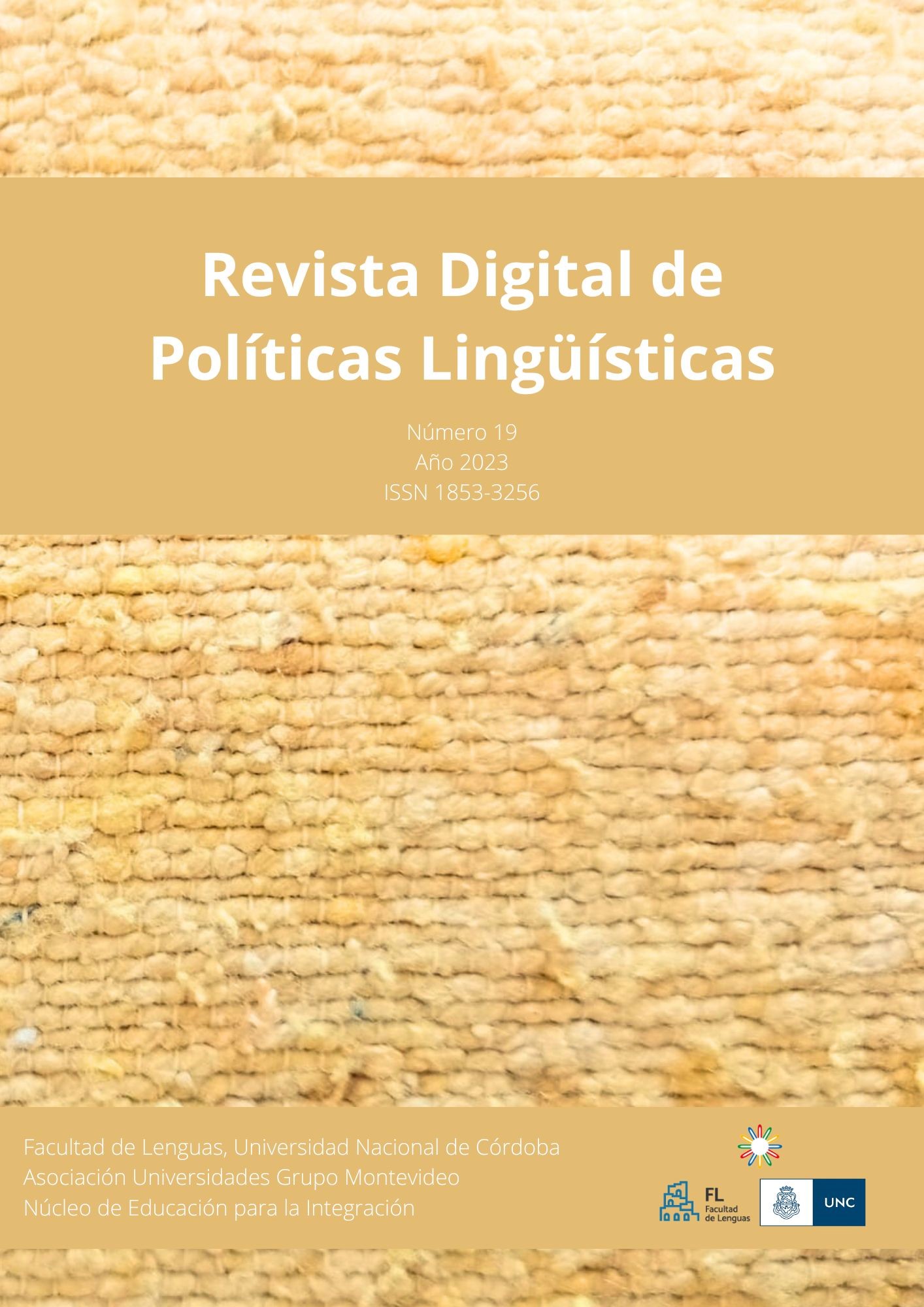THE ORGANIZATION OF CONTENT IN ENGLISH LANGUAGE SYLLABUS FOR ACADEMIC PURPOSES AT THE HIGHER EDUCATION LEVEL: FROM A SYNTHETIC APPROACH TO GENRE PEDAGOGY
Keywords:
English for Academic Purposes, reading comprehension, syllabus design, genre pedagogyAbstract
Several studies on different specialized genres have provided evidence of relevance for the design of English for Academic Purposes (EAP) syllabus at the higher education level. Although this line of research has been prolific, there is still a tendency to organise syllabuses around grammatical items, which reflects an atomistic view of language. The purpose of this contribution is to illustrate this trend by exploring the organization of the content in English reading comprehension programs at the National University of Córdoba and to argue in favour of Genre Pedagogy as a foundational basis for EAP teaching.
Downloads
References
Ballestero, C. & Batista, J. (2007). Evaluación de la enseñanza del inglés con fines específicos en educación superior. Omnia, 13(1), 105-129.
Basturkmen, H. (2010). Developing courses in English for Specific Purposes. Palgrave Macmillan.
Bhatia, V. (1993). Analysing genre. Language use in professional settings. Longman.
Bhatia, V. (2004-2014). Worlds of written discourse: A genre-based view. Continuum.
Bhatia, V. (2008). Genre analysis, ESP and professional practice. English for Specific Purposes, 27(2), 161-174.
Bruce, I. (2008). Academic writing and genre. A systematic analysis. Continuum.
Bruce, I. (2011). Developing an EAP syllabus: Approaches and models. En I. Bruce (Ed.), Theory and concepts of English for Academic Purposes (pp. 53-65). Palgrave-Macmillan.
Bruce, I. (2013). A role for genre-based pedagogy in academic writing instruction? An EAP perspective. Text, 21, 1-15.
Bruce, I. (2022). Social realism and genre theory: Knowledge-building in EAP. In A. Ding & M. Evans (Eds.), Social theory for English for Academic Purposes. Foundations and perspectives (pp. 113-134). Bloomsbury.
Cassany, D. & Morales, O. (2008). Leer y escribir en la universidad: Hacia la lectura y la escritura crítica de géneros científicos. Revista Memoralia, 5, 69-82.
Crystal, D. (2003). English as a global language. Cambridge University Press.
Ding, A., & Bruce, I. (2017). The English for Academic Purposes practitioner. Operating on the edge of the academia. Palgrave-Macmillan.
Dudley-Evans, T. & St John, M. (1998). Developments in ESP: A Multi-Disciplinary Approach. Cambridge University Press.
Flowerdew, L. (2013). Integrating traditional and critical approaches to syllabus design: the “what”, the “how” and the “why”? Journal of English for Academic Purposes, 4, 135-147.
Grabe, W. & Kaplan, R. (1996). Theory and practice of writing. Addison Wesley Longman.
Hyland, K. & Hamp-Lyons, L. (2002). EAP: Issues and directions. Journal of English for Academic Purposes, 1(1), 1-12.
Hyland, K. (2003). Genre-based pedagogies: a social response to process. Journal of Second Language Writing, 12(1), 17-29.
Hyland, K. (2004). Second language writing. Cambridge University Press.
Hyland, K. (2006). English for Academic Purposes. An advanced resource book. Routledge.
Hyland, K. (2007). Genre pedagogy: language, literacy and L2 language instruction. Journal of Second Language Writing, 16, 148-164.
Hyland, K. (2009). The case for specific purpose programs. In M. Long & C. Doughty (Eds.). The Handbook of Language Teaching (Chapter 12). Blackwell.
Hyland, K. (2013). Genre and Discourse Analysis in Language for Specific Purposes. In C. Chapelle (Ed.). The Concise Encyclopaedia of Applied Linguistics (pp. 2531-2532). Wiley-Blackwell.
Hyland, K. (2022). English for Specific Purposes: What is it and where is it taking us? ESP Today, 10(2), 202-220.
Johns, A. M. & Dudley-Evans, T. (1991). English for Specific Purposes: International in Scope, Specific in Purpose. TESOL Quarterly, 25(2), 297-314.
Martínez, I. (2011). Capitalizing on the advantages of the Latin American EAP situation: Using authentic and specific materials in EAP writing instruction. Ibérica, 21, 31-48.
Mugglestone, L. (2013). The Oxford history of English. Oxford University Press.
Nunan, D. (1998). Teaching grammar in context. ELT Journal, 52(2), 101-109.
Parkinson, J. (2013). English for science and technology. In B, Paltridge & S. Starfield (Eds.), The handbook of English for Specific Purposes (pp. 154-173). John Wiley & Sons.
Spector-Cohen, E., Kirschner, M., & Wexler, C. (2001). Designing EAP reading courses at the university level. English for Specific Purposes, 20, 367-386.
Swales, J. (1990). Genre analysis. English in academic and research settings. Cambridge University Press.
Swales, J. (2004). Research genres. Explorations and applications. Cambridge University Press.
Downloads
Published
Issue
Section
License

This work is licensed under a Creative Commons Attribution-NonCommercial-NoDerivatives 4.0 International License.
Aquellos/as autores/as que tengan publicaciones con esta revista, aceptan los términos siguientes:
- Los/as autores/as conservarán sus derechos de autor y garantizarán a la revista el derecho de primera publicación de su obra, el cual estará simultáneamente sujeto a la Licencia de reconocimiento de Creative Commons que permite a terceros compartir la obra siempre que se indique su autor y su primera publicación esta revista.
- La cesión de derechos no exclusivos implica que la publicación de los artículos en la presente revista no quita la posibilidad o el derecho al autor de publicar de manera posterior a otras revistas u órganos editoriales y la autorización por parte de los autores para que el trabajo sea depositado en los repositorio institucionales: Portal de Revistas de la Universidad Nacional de Córdoba.



